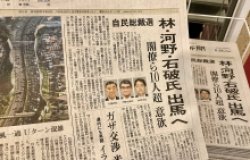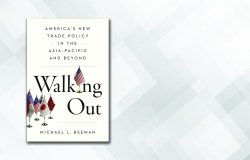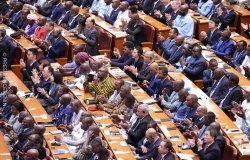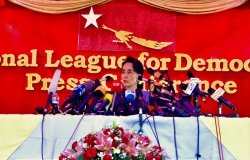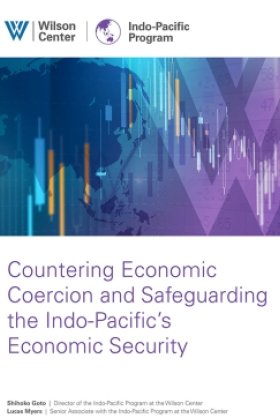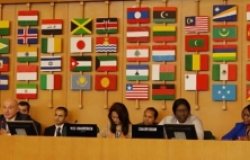'Comfort Women' Deal Is a Win-Win But Japan and Korea Must Do More
The strategic stakes are clear: facing both significant threats and enormous opportunities, Japan and Korea should seize this chance at a stronger bond.

Japan and South Korea reached a historic agreement last month on "comfort women" -- the women and girls enslaved by Japan's Imperial Army during World War II. In doing so, the two countries made a strong statement that diplomacy can be a positive-sum game. Now, two of America's closest allies have a chance to deepen their own ties -- but this fragile deal will need nurturing in the months ahead.
For too long, the dispute over Japan's wartime sexual abuse has been clouded by euphemism, bad history and missed opportunities. Just this April, Japanese Prime Minister Shinzo Abe drew justified fire for dodging the issue in his address to a joint session of Congress. He was right to acknowledge then that "armed conflicts have always made women suffer the most," but former comfort women, like Yong Soo Lee, who attended as Rep. Mike Honda's (D-Calif.) guest, deserved more.
Americans understand that this issue is challenging, and Japan's military isn't the only one with a sordid history on sexual assault. Our own continues to confront the horror of rape and abuse in its ranks; as I wrote in The Los Angeles Times in 2008, women in uniform were more likely to be assaulted by their fellow service members than killed by enemy fire in Iraq. And as an astonishing recent Washington Post investigation found, some of the men who victimized them still occupy senior leadership roles in the military offices dedicated to preventing sexual assault.
Japan deserves credit for taking this step toward accountability. Now 46 known survivors -- out of an estimated 20,000 or more original victims -- have a formal apology from Abe, as well as a share of $8.3 million in state reparations. But the agreement still has its share of critics in both countries.
This issue will never be closed if school textbooks and official memorials continue to misrepresent the truth.
One poll published last week found that a majority of Koreans aren't satisfied with the deal. Japan has an unfortunate habit of walking back its apologies. Ever since the 1993 Kono Statement, in which the chief cabinet secretary acknowledged that the Japanese army had coerced women into its brothels, the country's conservatives have been taking potshots at the historical consensus. As a result, Korea's citizens have an understandably hard time believing that Japan is committed to reconciliation. For the new agreement to stick, we need continued engagement.
Japan must do more to counter false histories. As a 2007 resolution that I backed in the House of Representatives made clear, this issue will never be closed if school textbooks and official memorials continue to misrepresent the truth. Too often, Abe's government has ignored or enabled the spread of dangerous narratives about the country's past -- narratives that continue to drive tension today. He must back efforts to continue educating his constituents on the facts.
South Korea, for its part, also has more work to do pitching its citizens on the agreement. The country's impressive president, Park Geun-hye, deserves credit for handling a sensitive issue with care. But as U.S. President Barack Obama has seen again and again in foreign policy, a smart strategy isn't enough -- you also need to communicate it. On this front, more can clearly be done to engage critics of the deal, especially former comfort women, whose perspective will be at the heart of any lasting resolution. If this deal is worth making, it also should be worth selling.
And for citizens in both countries, the benefits of engagement are clear. Getting this contentious issue off the books could open up new avenues for cooperation for the region's most free, dynamic and democratic nations. Greater intelligence sharing, reportedly under consideration now, would be an appropriate icebreaker, especially given shared threats like China's ambitions and North Korea's nukes. Trade may gain new momentum too -- momentum that the White House would welcome, given the Trans-Pacific Partnership's chilly reception on Capitol Hill.
More can clearly be done to engage critics of the deal, especially former comfort women, whose perspective will be at the heart of any lasting resolution.
As a friend and partner to both countries, the administration is in a unique position to pitch the gains from friendship and partnership. And the strategic stakes are clear: facing both significant threats and enormous opportunities, Japan and Korea should seize this chance at a stronger bond.
Because as my Congressional classmate Rep. Ed Royce (R-Calif.), chairman of the House Foreign Affairs Committee and a leader on this issue, says, "It's much harder to get tomorrow right if we get yesterday wrong."
The opinions expressed here are solely those of the author.
This article was originally published in the Huffington Post.
Photo Credit: Flickr user Melissa Wall (CC-BY-NC 2.0)
About the Author

Jane Harman
Jane Harman, Distinguished Fellow and President Emerita, Wilson Center, is an internationally recognized authority on U.S. and global security issues, foreign relations and lawmaking. A native of Los Angeles and a public-school graduate, she went on to become a nine-term member of Congress, serving decades on the major security committees in the House of Representatives. Drawing upon a career that has included service as President Carter’s Secretary of the Cabinet and hundreds of diplomatic missions to foreign countries, Harman holds posts on nearly a dozen governmental and non-governmental advisory boards and commissions.
Read More
Indo-Pacific Program
The Indo-Pacific Program promotes policy debate and intellectual discussions on US interests in the Asia-Pacific as well as political, economic, security, and social issues relating to the world’s most populous and economically dynamic region. Read more

